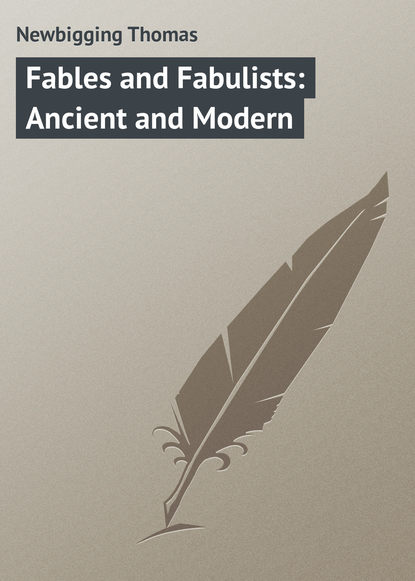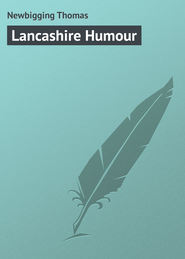По всем вопросам обращайтесь на: info@litportal.ru
(©) 2003-2024.
✖
Fables and Fabulists: Ancient and Modern
Настройки чтения
Размер шрифта
Высота строк
Поля
R. M. Milnes.
Gotthold Ephraim Lessing, born January 22, 1729, at Kamenz, died February 15, 1781, aged fifty-two years, was a distinguished German scholar, poet and dramatist. As a fabulist, Lessing is noted for epigrammatic point rather than humour, though he is by no means lacking in the latter characteristic. He is perhaps the most original writer of fables amongst the moderns. Sagacious, wise, witty, his apologues (1759) have nothing superfluous about them. They are nearly all brief, pithy, and very much to the point. In these respects they follow the Æsopian model more than those of any other modern writer. The following are good examples of his style:
'Æsop and the Ass.– "The next time you write a fable about me," said the donkey to Æsop, "make me say something wise and sensible."
'"Something sensible from you!" exclaimed Æsop; "what would the world think? People would call you the sage, and me the donkey!"
'The Shepherd and the Nightingale.– "Sing to me, dearest nightingale," said a shepherd to the silent songstress one beautiful spring evening.
'"Alas!" said the nightingale, "the frogs make so much noise that I have no inclination to sing. Do you not hear them?"
'"Undoubtedly I hear them," replied the shepherd, "but it is owing to your silence."
'Solomon's Ghost.– A venerable old man, despite his years and the heat of the day, was ploughing his field with his own hand, and sowing the grain in the willing earth, in anticipation of the harvest it would produce.
'Suddenly, beneath the deep shadow of a spreading oak, a divine apparition stood before him! The old man was seized with affright.
'"I am Solomon," said the phantom encouragingly, "what dost thou here, old friend?"
'"If thou art Solomon," said the owner of the field, "how canst thou ask? In my youth I learnt from the ant to be industrious and to accumulate wealth. That which I then learnt I now practise."
'"Thou hast learnt but half of thy lesson," pursued the spirit. "Go once more to the ant, and she will teach thee to rest in the winter of thy existence, and enjoy what thou hast earned."'
Don Tomas de Yriarte, or Iriarte, a Spanish fabulist of the eighteenth century, born at Teneriffe in 1750, is held in much esteem by cultured readers in Spain. His 'Fabulas Literarias,' or Literary Fables (1782), sixty-seven in all, and mostly original, were written with a view to inculcating literary truths. In other words, their object was to praise or censure literary work according to its supposed deserts. Their moral or application is therefore limited in scope; they do not touch human nature as a whole, and being thus restricted in their range, they are deficient in general interest and value. Obviously, however, it is possible to give a wider application to the truths enforced in the apologues, and this is sometimes done by omitting the special moral supplied by the writer. Yriarte's versification is graceful and sprightly, 'combining the exquisite simplicity of the old Spanish romances and songs with the true spirit of Æsopian fable;'[62 - Bouterwick's 'History of Spanish Literature,' book iii., chap. iii.] some of them are composed in the redondilla measure much affected by the lyrical poets of Spain, and please by their style quite as much as by their intrinsic merits. Yriarte died in 1791. We select the piece which follows to illustrate his skill as a fabulist:
'The Two Thrushes
'A sage old thrush was once discipling
His grandson thrush, a hair-brained stripling,
In the purveying art. He knew,
He said, where vines in plenty grew,
Whose fruit delicious when he'd come
He might attack ad libitum.
"Ha!" said the young one, "where's this vine?
Let's see this fruit you think so fine."
"Come then, my child, your fortune's great; you
Can't conceive what feasts await you!"
He said, and gliding through the air
They reached a vine, and halted there.
Soon as the grapes the youngster spied,
"Is this the fruit you praise?" he cried;
"Why, an old bird, sir, as you are,
Should judge, I think, more wisely far
Than to admire, or hold as good,
Such half-grown, small, and worthless food.
Come, see a fruit which I possess
In yonder garden; you'll confess,
When you behold it, that it is
Bigger and better far than this."
"I'll go," he said; "but ere I see
This fruit of yours, whate'er it be,
I'm sure it is not worth a stone
Or grape-skin from my vines alone."
They reached the spot the thrushlet named,
And he triumphantly exclaimed:
"Show me the fruit to equal mine!
A size so great, a shape so fine;
What luxury, however rare,
Can e'en your grapes with this compare?"
The old bird stared, as well he might,
For lo! a pumpkin met his sight.
Now, that a thrush should take this fancy
Without much marvelling I can see;
But it is truly monstrous when
Men, who are held as learned men,
All books, whatever they be, despise
Unless of largest bulk and size.
A book is great, if good at all;
If bad, it cannot be too small.'
Ivan Andreivitch Krilof, or Krilov, the Russian, who was born in Moscow, February 2, 1768, O.S., and died in St. Petersburg on November 9, 1844, aged seventy-six years, was one of the greatest original fabulists of modern times. One writer (an Englishman) goes so far as to claim for him the position of 'the crowned King of the fabulists of all languages.' His published fables amount altogether to two hundred and two, of which thirty-five only are borrowed, the rest being original. They are in rhymed verse in the Russian, and an English translation, also in verse, and with a close adherence to the text in the original, has been made by Mr. J. Henry Harrison.[63 - London: Remington and Co., 1883.] An excellent prose translation, with a life of Krilof, by the late Mr. W. R. S. Ralston, M.A., was published in 1868.[64 - London: Strahan and Co., 1868. A second edition appeared the year following.]
Krilof is characterized by rich common sense and sound judgment, a rare vein of satire and an excellent humour. He indeed brims over with sarcastic humour. A kind of rugged directness of language, well calculated to undermine the shams and abuses at which he aimed, also distinguishes his apologues. He deserves to be better known in this country.
Krilof was a journalist, and wrote a number of dramas, both in tragedy and comedy, before turning his attention to fables. It is on these latter that his claim to distinction rests. He rose to high eminence in his native country, where his name is a household word; he was patronized by royalty, and beloved by the common people, and at his death a monument to his memory was erected in the Summer Garden at St. Petersburg.
The following translation of Krilof's beautiful fable of The Leaves and the Roots is from a brilliant article in Fraser's Magazine for February, 1839:
''Twas on a sunny summer day,
Exulting in the flickering shade
They cast athwart the greensward glade,
The leaves, a fluttering host,
Thus 'gan their worth to boast,
And to each other say:
"Is it not we
That deck the tree —
Its stem and branches all array
In verdant pomp and vigorous grace?
Deprived of us, how altered were their case!
Is it not we who form the grateful screen
Of foliage and luxuriant green,
Welcome to traveller and to swain?
Yes! we may be deeméd vain,
But we it is whose charms invite
Youths and maidens to the grove;
And we it is, too, who at night
Shelter in her retired alcove
The songstress of the woods, whose strain
Wafts music over dale and plain!






